Western Saharan activist's hunger strike hurt Morocco: analysts
Elisa Santafe
MADRID, Elisa Santafe- A month-long hunger strike by Western Sahara independence activist Aminatou Haidar at a Spanish airport hurt Morocco by raising awareness of human rights abuses in the territory, analysts said Friday.
Rabat yielded to pleas from foreign governments and allowed her to fly back to Laayoune, the main town in the disputed Moroccan territory, on Friday on a plane with medical equipment because of her fragile health.

Aminatou Haidar giving a press conference in Lanzarote airport
Jesus Garcia-Luengos, a researcher at Spain's Institute of Studies on Conflicts and Humanitarian Action (IECAH), said the affair "had given Morocco a negative image because it violated international law by deporting Haidar".
"Besides it contributes to a greater awareness at the international level of the violations on the part of Morocco of human rights in Western Sahara," he told AFP.
Haidar was camped out at the airport on the holiday island surrounded by an ever-increasing group of supporters until she was rushed to hospital on Wednesday suffering from severe stomach and abdominal pains and vomiting.
Her cause was taken up by celebrities including Oscar-winning Spanish actor Javier Bardem and Portuguese Nobel literature laureate Jose Saramago. The US state department also expressed concern about her health.
The hunger strike was front-page news in most Spanish newspapers and it drew growing international attention as Haidar's health worsened.
The affair could mark a turning point in Spain's relations with Morocco, which have improved since Socialist Prime Minister Jose Luis Rodriguez Zapatero came to power in 2004, said Manuel de la Rocha, an Africa expert at the Observatory of Spanish Foreign Policy thinktank.
"Given the intransigence shown by Morocco, this could be a point of inflection where the government returns to a more critical position with Morocco regarding human rights and the Sahara," he told AFP.
The press coverage of Haidar's hunger strike threw the spotlight on the fact that she was held without charge for four years in Moroccan jails where she says she was tortured.
She was also beaten by police for taking part in peaceful pro-independence demonstrations.
Morocco annexed the Western Sahara following the hasty withdrawal of colonial power Spain in the dying days of the regime of right-wing dictator Francisco Franco, sparking a war with the Algeria-backed Polisario Front movement.
The two sides agreed a ceasefire in 1991, but UN-sponsored talks on its future have since made no headway.
Morocco has pledged to grant the phosphate-rich territory widespread autonomy, but rules out independence. The Polisario Front wants a referendum on self-determination, with independence as one of the options.
Garcia-Luengos said Morocco had "shot itself in the foot" by deporting Haidar.
"Morocco is offering autonomy for Western Sahara based on a good government for the region but what the international community understands is that Morocco does not have the political will to put this in place," he said.
But observers said Morocco was unlikely to soften its position on Western Sahara, which is sometimes called Africa’s last remaining colony.
"For that to happen there would have to exist very strong international pressures from other international forces and I doubt they would be willing to exercise that pressure," Maria Dolores Algora, an international relations professor at Madrid's CEU San Pablo University, told AFP.
-----------------------------------------------------------------------------------------------------------------------------------